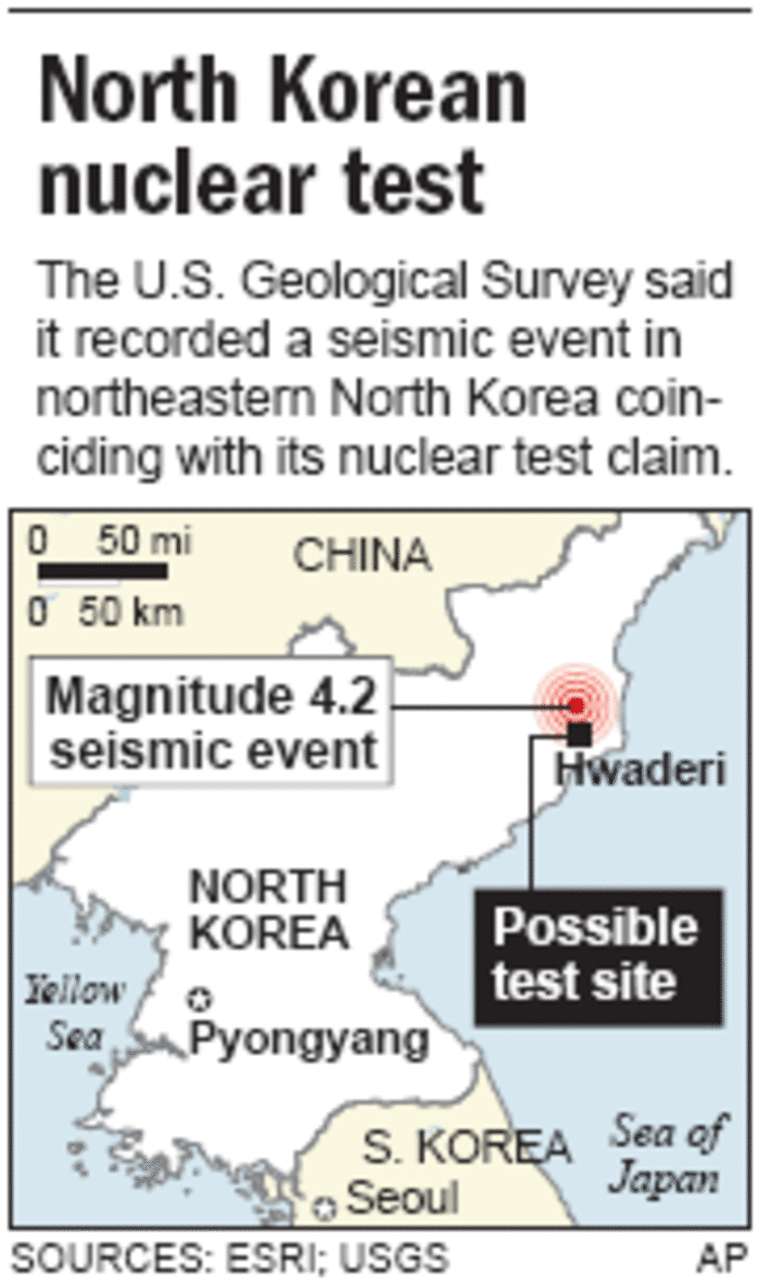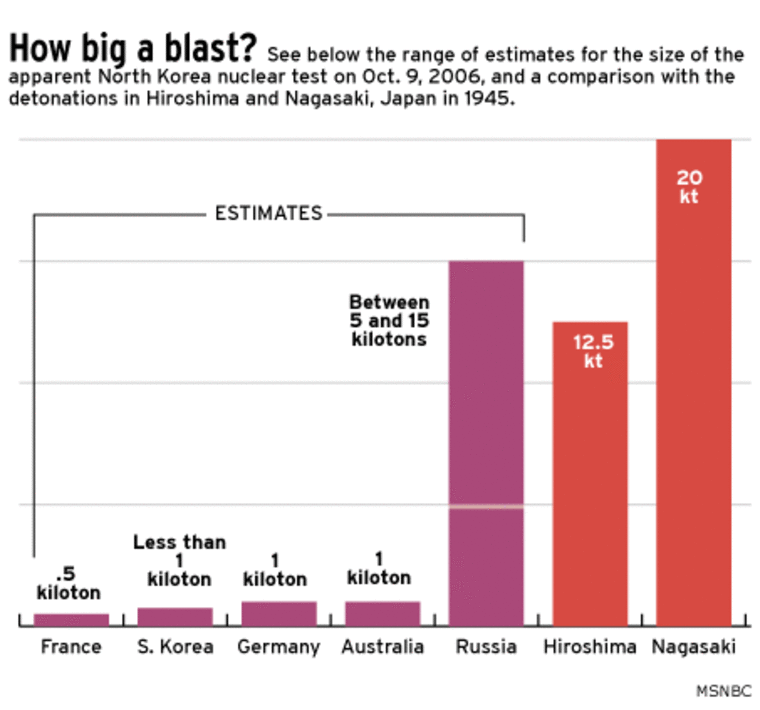The world's nations expressed opposition to North Korea on Monday for staging a nuclear test denounced even by key allies. President Bush called it “a threat to international peace and security,” and the U.N. Security Council weighed severe sanctions to punish the impoverished but reclusive communist nation.
Bush called the communist regime’s claim of a nuclear test a provocative act and warned Pyongyang against exporting nuclear materials.
“Once again, North Korea has defied the will of the international community, and the international community will respond,” Bush said.
Bush said North Korea already is one of the world’s leading proliferators of missile technology, including transfers to Iran and Syria.
“The transfer of nuclear weapons or material by North Korea to states or nonstate entities would be considered a grave threat to the United States,” Bush said in a brief statement in the diplomatic reception room at the White House. “And we would hold North Korea fully accountable for the consequences of such action.”
There was no talk of military action. But the United States circulated a draft U.N. resolution late Monday that would condemn North Korea’s nuclear test and impose tough sanctions on Pyongyang for flagrantly disregarding the Security Council’s appeal not to detonate a device.
The draft, obtained by the Associated Press, incorporates proposals circulated by the U.S. earlier in the day, and adds new proposals from Japan that would ban all countries from allowing any North Korean ships in their ports or any North Korean aircraft from taking off or landing in their territory.
The new Japanese proposals would also impose travel restrictions on high-ranking North Korean officials.
Nine years and a day
The reported test came one day after the ninth anniversary of reclusive North Korean leader Kim Jong Il’s accession to power.
Members of the 15-nation Security Council were unanimous Monday in denouncing the claim amid worldwide concern that it could seriously destabilize the region, with even North Korean ally China saying it was strongly opposed to the move.

“No one defended it, no one even came close to defending it,” U.S. Ambassador John Bolton said. “I was very impressed by the unanimity of the council ... on the need for a strong and swift answer to what everyone agreed amounted to a threat to international peace and security.”
The Security Council had warned the impoverished and isolated nation just two days earlier not to go through with a test, and Bolton said Washington will seek U.N. sanctions to curb North Korea’s import and export of material for weapons of mass destruction, as well as its illicit financial activities.
Sanction specifics
Bolton and key U.S. allies, including Britain and France, sought a resolution under Chapter 7 of the U.N. Charter that would seek punishing measures, going beyond the limited sanctions in a measure adopted by the council in July after North Korea conducted seven missile tests.
Chapter 7 grants the council the authority to impose a range of measures including breaking diplomatic ties, imposing economic and military action.
North Korea’s U.N. ambassador Pak Gil Yon said the Security Council should congratulate his country instead of passing “useless” resolutions or statements.
AP Television News footage showed North Koreans going about their daily business and there were no signs of heightened alert by security forces in Pyongyang on Monday, hours after their government said it performed a nuclear weapons test.
Flowers for father
People also laid flowers by a statue of Kim Il Sung, the current leader’s father who died in 1994, ahead of Tuesday’s 61st anniversary of the North Korean Workers’ Party that he founded. Red flags of the party draped buildings and lampposts.
Iranian state radio, meanwhile, blamed North Korea’s reported nuclear test on U.S. pressure, saying the test “was a reaction to America’s threats and humiliation.”
Iran has said it will not abandon uranium enrichment despite the threat of international sanctions over its disputed nuclear program, which Tehran insists is purely for peaceful purposes.
Bush said the United States was still attempting to confirm that a nuclear test had actually taken place. Still, he said, “such a claim itself constitutes a threat to international peace and security.”
A U.S. government official, who spoke on condition of anonymity because of the political sensitivity of the situation, said the seismic event could have been a nuclear explosion, but its small size was making it difficult for authorities to pin down.
South Korea’s National Intelligence Service chief Kim Seung-kyu reportedly told lawmakers signs of suspicious movement were spotted at another suspected test site.
The current members of the nuclear club are the United States, Russia, Britain, France, India, Pakistan and China. Israel is widely believed to have the bomb but has not publicly declared so.
No doubts for Moscow
Reports about the size of the explosion were conflicting. Only Russia said the blast was a nuclear explosion but the reaction of world governments reflected little doubt that they were treating the announcement as fact.
“We have no doubts that it (the test) was nuclear,” Russian Defense Minister Sergei Ivanov said.
The Russian Foreign Ministry summoned Pyongyang’s ambassador to Russia, demanding that North Korea “immediately take steps to return to the regime of the Nuclear Nonproliferation Treaty” and to the six-nation talks.
South Korea’s geological institute estimated the force of the explosion to be equivalent to 550 tons of TNT, far smaller than the two nuclear bombs the U.S. dropped on Japan in World War II.
The head of South Korea’s spy agency said the blast was equal to less than 1,000 tons of TNT, the South Korean Yonhap news agency reported.
France’s atomic energy commission similarly estimated the blast measured at around 1 kiloton or less — equivalent to the explosive force of 1,000 tons of TNT.
Ivanov said it was far more powerful, equivalent to 5,000 to 15,000 tons of TNT.
The U.S. Geological Survey said it recorded a magnitude 4.2 seismic event in northeastern North Korea. Asian neighbors also said they registered a seismic event, and an official of South Korea’s monitoring center said the magnitude 3.6 tremor wasn’t a natural occurrence.
Japan dispatched three aircraft to waters between Japan and the Korean peninsula to monitor radiation levels, the Defense Agency said. Russia reported no increase in radiation levels in its Primorye territory, which borders North Korea.

Nuclear blasts give off clear seismic signatures that differentiate them from other explosions, said Friedrich Steinhaeusler, a professor of physics at Salzburg University. Even if the bomb the North Koreans detonated was small, sensors in South Korea would likely be close enough to categorize the explosion as nuclear, he said.
“I think we have to take them at their word. They’re not the type of regime to bluff,” said Peter Beck, Seoul-based analyst for International Crisis Group, a conflict-resolution think tank.
Shift of balance of power?
Although North Korea has long claimed it had the capability to produce a bomb, the test would be the first manifest proof that it had done so. A nuclear armed North Korea would dramatically alter the strategic balance of power in the Pacific region and would undermine already fraying global anti-proliferation efforts.
“The development and possession of nuclear weapons by North Korea will in a major way transform the security environment in North Asia and we will be entering a new, dangerous nuclear age,” Japanese Prime Minister Shinzo Abe said at a news conference in Seoul after a summit with South Korean President Roh Moo-hyun.
Abe, facing his first major foreign policy test since his recent election, called for a “calm yet stern response.” Japanese Foreign Minister Taro Aso warned such a test would “severely endanger not only Northeast Asia but also the world stability.”
South Korea said it had put its military on high alert, but it had noticed no unusual activity among North Korea’s troops.
China, the North’s closest ally and its main source of food, expressed its “resolute opposition” to the reported test and urged the North to return to six-party nuclear disarmament talks. It said the North “defied the universal opposition of international society and flagrantly conducted the nuclear test.”
Putin, Blair condemn action
Russian President Vladimir Putin told his Cabinet that Moscow “certainly condemns the test conducted by North Korea.”
British Prime Minister Tony Blair said the test was a “completely irresponsible act.”
The North has refused for a year to attend six-party international talks aimed at persuading it to disarm, calling for the U.S. to drop sanctions it has imposed to punish it for alleged counterfeiting and money laundering. It pulled out of the Nuclear Nonproliferation Treaty in 2003 after U.S. officials accused it of a secret nuclear program, allegedly violating an earlier nuclear pact between Washington and Pyongyang.
The North’s official Korean Central News Agency said the test was successful, with no leak of radiation.
North Korean scientists “successfully conducted an underground nuclear test under secure conditions,” the government-controlled agency said, adding this was “a stirring time when all the people of the country are making a great leap forward in the building of a great prosperous powerful socialist nation.”
“It marks a historic event as it greatly encouraged and pleased the ... people that have wished to have powerful self-reliant defense capability,” KCNA said. “It will contribute to defending the peace and stability on the Korean Peninsula and in the area around it.”
South Korea said the test was conducted at 10:36 a.m. (9:36 p.m. EDT Sunday) in Hwaderi near Kilju city on the northeast coast. South Korean intelligence officials said the seismic wave had been detected in North Hamkyung province, the agency said.
Crowded Security Council agenda
North Korea was added to the agenda of an already scheduled Security Council meeting that officially nominated South Korean Foreign Minister Ban Ki-moon to succeed Kofi Annan as secretary-general, and he said he would work to resolve the North Korean crisis.
The Security Council resolution adopted in July imposed limited sanctions on North Korea and demanded that the reclusive communist nation suspend its ballistic missile program — a demand the North immediately rejected.
The resolution bans all U.N. member states from selling material or technology for missiles or weapons of mass destruction to North Korea — and it bans all countries from receiving missiles, banned weapons or technology from Pyongyang.
The North is believed to have enough radioactive material for about a half-dozen bombs. It insists its nuclear program is necessary to deter a U.S. invasion.
The North has active missile programs, but it isn’t believed to have an atomic bomb design small and light enough to be mounted on a long-range rocket that could strike targets as far as the U.S.
Speculation over a possible North Korean test arose earlier this year after U.S. and Japanese reports cited suspicious activity at a suspected underground test site.
Economic impact in region
South Korean stocks plunged Monday following North Korea’s announcement of the test. The South Korean won also fell sharply.
Markets in South Korea, the world’s 10th-largest economy, have long been considered vulnerable to potential geopolitical risks from the North. The two countries, which fought the 1950-53 Korean War, are divided by the world’s most heavily armed border.
The conflict ended in a cease-fire that has yet to be replaced with peace treaty, are divided by the world’s most heavily armed border. However, they have made unprecedented strides toward reconciliation since their leaders met at their first-and-only summit in 2000.
Impoverished and isolated North Korea has relied on foreign aid to feed its 23 million people since its state-run farming system collapsed in the 1990s following decades of mismanagement and the loss of Soviet subsidies.